
J. Scott Marcus
J. Scott Marcus is a Senior Fellow at Bruegel, a Brussels-based economics think tank, and also works as an independent consultant dealing with policy and regulatory policy regarding electronic communications. His work is interdisciplinary and entails economics, political science / public administration, policy analysis, and engineering.
From 2005 to 2015, he served as a Director for WIK-Consult GmbH (the consulting arm of the WIK, a German research institute in regulatory economics for network industries). From 2001 to 2005, he served as Senior Advisor for Internet Technology for the United States Federal Communications Commission (FCC), as a peer to the Chief Economist and Chief Technologist. In 2004, the FCC seconded Mr. Marcus to the European Commission (to what was then DG INFSO) under a grant from the German Marshall Fund of the United States. Prior to working for the FCC, he was the Chief Technology Officer (CTO) of Genuity, Inc. (GTE Internetworking), one of the world's largest backbone internet service providers.
Mr. Marcus is a member of the Scientific Committee of the Communications and Media program at the Florence School of Regulation (FSR), a unit of the European University Institute (EUI). He is also a Fellow of GLOCOM (the Center for Global Communications, a research institute of the International University of Japan). He is a Senior Member of the IEEE; has served as co-editor for public policy and regulation for IEEE Communications Magazine; served on the Meetings and Conference Board of the IEEE Communications Society from 2001 through 2005; and was Vice Chair and then Acting Chair of IEEE CNOM. He served on the board of the American Registry of Internet Numbers (ARIN) from 2000 to 2002.
Marcus is the author of numerous papers, a book on data network design. He either led or served as first author for numerous studies for the European Parliament, the European Commission, and national governments and regulatory authorities around the world.
Marcus holds a B.A. in Political Science (Public Administration) from the City College of New York (CCNY), and an M.S. from the School of Engineering, Columbia University.
Disclaimer of external interests
Declaration of interests 2023-2024
Declaration of interests 2022-2023
Declaration of interests 2021-2022
Featured work

Tech firms’ promise to fight election fakes is a good start, but only a start
Digital firms must work with urgency to tackle deceptive content designed to mislead voters

A dataset on EU legislation for the digital world
The emergence of non-personal data markets

Adapting the European Union AI Act to deal with generative artificial intelligence
The European Union’s draft AI Act already needs to be revised to account for the opportunities and harms of generative AI.

Future of Work and Inclusive Growth Annual Conference 2023
Annual Conference of the Future of Work and Inclusive Growth project

Compensation between Content and Application Providers (CAPs) and network operators: An evolving discussion
Are online platform providers obliged to fund the broadband networks in the EU?

A high-level view of the impact of AI on the workforce
A transatlantic study makes the right recommendations on artificial intelligence in the workplace, but work is needed to turn these into practice.

E-commerce and the EU Green Deal - Analysis of the environmental footprint of online sales in the context of the circular economy
This study provides information on the role of e-commerce in implementing the European Green Deal and makes recommendations for future action.

Coherent and consistent implementation of EU digital policies
How will the EU's many digital policies work together?

The European Health Data Space

Promotion of high capacity broadband to rebuild and recover from the pandemic
High-capacity broadband infrastructure will be a key enabler of a forward-looking recovery after COVID-19.

A transatlantic conversation on the Future of Work
Public workshop on the Transatlantic Expert Group on the Future of Work in Washington, DC.

Exchange of views on Transatlantic Dialogue and Cooperation on strategic considerations as regards semiconductors
Testimony on the EU Chips Act and the prospects for EU-US cooperation on semiconductors

COVID-19 in the European Union: health impacts and effects on economic activity
What matters when it comes to managing the pandemic is to prevent intensive-care admissions and deaths arising from COVID-19.

COVID-19 and the shift to remote work
Hybrid arrangements in which part of the week is spent at the office, and part at home, are likely to become the norm.

Future of Work and Inclusive Growth Annual Conference 2022
First Annual Conference of the Future of Work and Inclusive Growth project

COVID-19 and the shift to working from home: differences between the US and the EU
What changes has working from home brought on for workers and societies, and how can policy catch up?

The decoupling of Russia: European vulnerabilities in the high-tech sector
The EU will face challenges in sectors where it relies on Russian and Ukrainian commodities and technologies.

The decoupling of Russia: high-tech goods and components
Sanctions on high-tech goods supplies, combined with financial sanctions and other restrictions, will deprive Russia of a future as a modern economy.
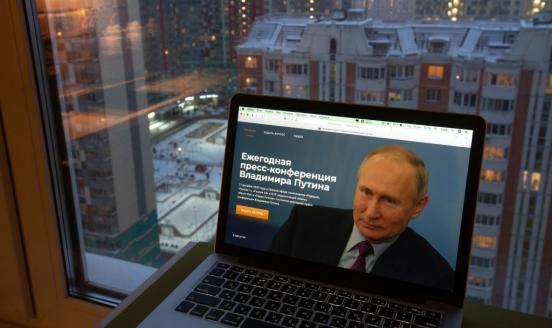
The decoupling of Russia: software, media and online services
Restrictions so far on software, media and online services in Russia have been imposed either voluntarily by firms, or else by Russia itself in order

What will be the impact of Europe’s next round of COVID-19 restrictions?
As COVID-19 cases surge, the choice of restrictions, and the details of their implementation, can have a major influence on the degree to which busine

Academic lecture: International technology competition
Bruegel Annual Meetings, Day 3 - On the final day of the Annual Meetings, our Director Guntram Wolf sits with Keyu Jin to discuss international compet
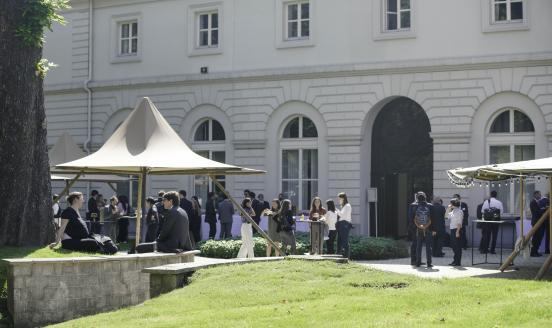
Bruegel Annual Meetings, 1-3 September 2021
The 2021 Annual Meetings gathered high-level speakers and participants to discuss how to recover from the crises brought on by the Covid pandemic

Will European Union recovery spending be enough to fill digital investment gaps?
The recovery facility will boost digital transformation, but questions remain whether it will be sufficient to achieve Europe’s digital ambitions.

The Recovery and Resilience Fund: Accelerating the digitalisation of the EU?
How can new EU funds supplement national digital and green funding and EU funds from the standard seven-year EU budget to accelerate digitalisation?

An update: Vaccination in the EU
Progress has been made, but more progress is needed.

The impact of COVID-19 on the Internal Market
Study assessing the impact of the COVID-19 crisis on the European Union's Internal Market and consumer protection prepared for the European Parliament

Has the European Union squandered its coronavirus vaccination opportunity?
The European Union’s purchases of frontrunner coronavirus vaccines are insufficient for the population’s near-term needs. The shortfall could have hea

Free movement of data: how to maintain necessary sharing among the EU, UK, and USA?
In the current legal climate, how can the EU, the US and the UK continue to share data?

Future of data economy: a conversation with Thierry Breton and Maximilian Schrems
How will the data travel between the EU and the US in the aftermath of the Schrems II ruling?

Legal obstacles in Member States to Single Market rules
This study analyses the current state of national obstacles to freemovement in the EU Single Market.

Bruegel Annual Meetings 2020 - Day 2
Second day of Bruegel Annual Meetings.
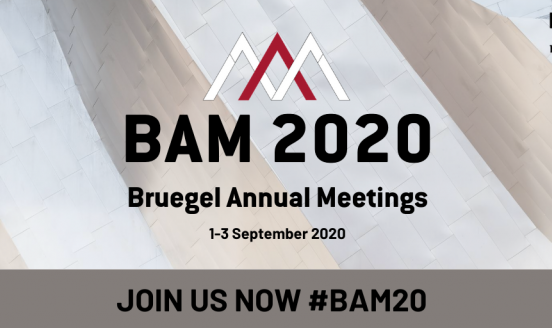
Bruegel Annual Meetings 1-3 September, 2020
Bruegel's flagship event transformed into a virtual conference for pandemic times

New challenges to transfers of personal data from the EU to the United States
The judgment not only immediately invalidates Privacy Shield, but may also have the effect, once the dust has settled, of effectively blocking transfe

The impact of COVID-19 restrictions on individual mobility
Distancing measures imposed by twelve European countries during the COVID-19 pandemics (a ban on holding public events, school closures, shop closures
An alternative mobile operating environment?
Walking the wire: we discuss risks and benefits involved for the EU should it embark on developing a new smartphone operating system.

Technology, data, privacy, and the fight against disease
Reconciling health and privacy needs.

Promoting product longevity
How can the EU product safety and compliance framework help promote product durability and tackle planned obsolescence, foster the production of more

Big data versus COVID-19: opportunities and privacy challenges
All available resources need to be brought to bear on the novel coronavirus COVID-19. To what extent can digital technology help? What risks are there
Improving regulatory policy formulation and institutional resilience in Europe
Are large differences in the resilience of individual economies related to differences in the quality of country-level institutions that shape the abs
Competition policy in the era of AI – the case of Japan and Europe
How can artificial intelligence have a positive impact on the economy? How does AI impact competition policy? How can the EU and Japan become leaders

Questions to Sylvie Goulard, Commissioner designate for Internal Market
If confirmed. Commissioner-designate Goulard will soon have direct responsibility for three areas within this broader mandate. Firstly, digital econom
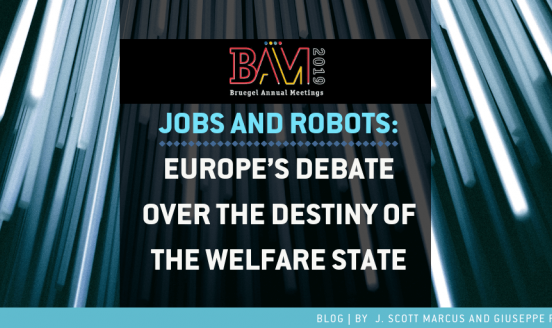
Jobs and robots: Europe’s Debate Over the Destiny of the Welfare State
This blog is part of a series following the 2019 Bruegel annual meetings, which brought together nearly 1,000 participants for two days of policy deba

Bruegel Annual Meetings 2019, 4-5 September
The 2019 Annual Meetings featured the launch of Bruegel's memos to the new European Leadership, proposing how to deal with future policy challenges
Bruegel Annual Meetings 2019
Bruegel's 2019 Annual Meetings will be held on 4-5 September and feature the launch of Bruegel's Memos to the New European Commission.
AI, robots and platform workers: What future for European welfare states?
At this event, we launch the study, "Digitalisation and European welfare states", authored by Georgios Petropoulos, J. Scott Marcus, Nicolas Moës, and

Digitalisation and European welfare states
EU policymakers must find answers to pressing questions: if technology has a negative impact on labour income, how will the welfare state be funded? H

EU-LAC Economic Forum 2019: New perspectives in turbulent times
The third edition of the EU-LAC Economic Forum.

Liability: When Things Go Wrong in an Increasingly Interconnected and Autonomous World: A European View
In the following article, Scott Marcus first considers the sources of potential defects and what might be done to redress them. He then goes on to con
Changing relationships between Europe and Africa in the face of technological development – can digitalisation, AI and the platform economy help bridge the gap?
This event will look at digitalisation in Europe and Africa and how this is changing the relationship between the two continents
Rethinking industrial policy in the digital age: challenges for Europe
All-day conference about how the European policy-making will have to adapt to the digital transformation.

Contribution to Growth: The European Digital Single Market
Numerous legislative measures have been initiated or enacted in support of the overall achievement of a Digital Single Market (DSM). This in-depth ana

Preliminary observations on the European Commission’s Android decision
Following the announcement that Alphabet (Google) will appeal the European Commission's ruling on the competition case against its Android mobile oper

Post-Brexit transfers of personal data: The clock is ticking
The UK government would like to keep EU-UK data transfers largely the same following the country's separation from the EU. But talks have yet to even
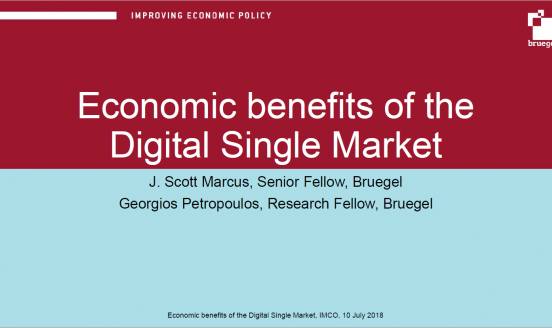
Economic benefits of the Digital Single Market
Testimony before the European Parliament Committee on the Internal Market and Consumer Protection (IMCO).

The role of independent expertise in legislative process
Testimony before the European Parliament Committee on the Internal Market and Consumer Protection (IMCO).
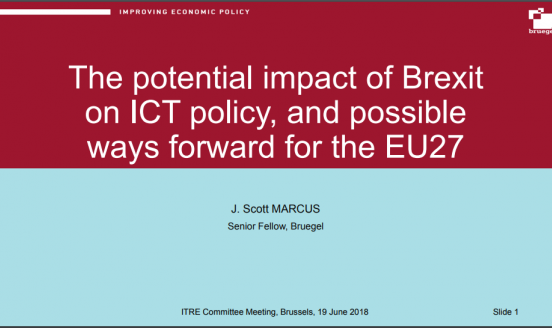
The potential impact of Brexit on ICT policy
Testimony before the European Parliament's Committee on Industry, Research and Energy (ITRE).
EU-LAC Economic Forum 2018
The second edition of the EU-LAC Economic Forum, a high level gathering for in-depth research-based exchanges on economic issues between European, Lat

Challenges and opportunities for the EU digital single market
At this event, we looked into the progress made towards achieving the main priorities for strengthening the digital single market, the opportunities a

Network Sharing and 5G in Europe: The Potential Benefits of Using SDN or NFV
What technological, economic, and regulatory policy implications might flow from the use of Software Defined Networks (SDN) and Network Function Virtu

Can roaming be saved after Brexit?
The referendum where UK voters chose to exit the European Union has many unanticipated consequences. One that is gaining visibility in the UK just now

Remaking Europe: the new manufacturing as an engine for growth
Europe needs to know how it can realise the potential for industrial rejuvenation. How well are European firms responding to the new opportunities for
Economic Implications of Further Harmonisation of Electronic Communications Regulation in the EU
One of the ways in which the European Commission has sought over the years to strengthen the European single market is by means of increased harmonisa
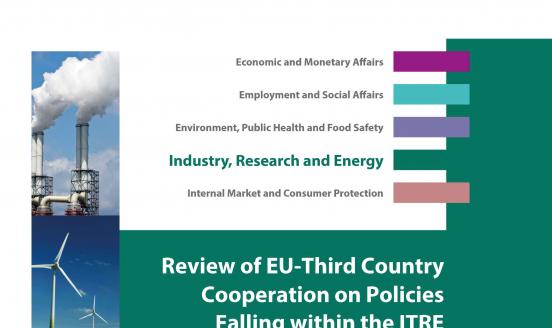
Review of EU-third country cooperation on policies falling within the ITRE domain in relation to Brexit
What is the possible future relationship between the EU and the UK in light of Brexit? The report provides a critical assessment of the implications o
Geo-blocking in the digital single market
Geo-blocking is a discriminatory practice that is wide-spread in EU. It prevents online customers from accessing and purchasing products or services f
Protecting the privacy of electronic communications: getting the next steps right
Do the European Commission's recent initiatives put us on the right path?
High expectations for 5G confront practical realities
The next wave of mobile network innovation is provoking great excitement in the industry. And indeed, there is substantial potential for improvement.
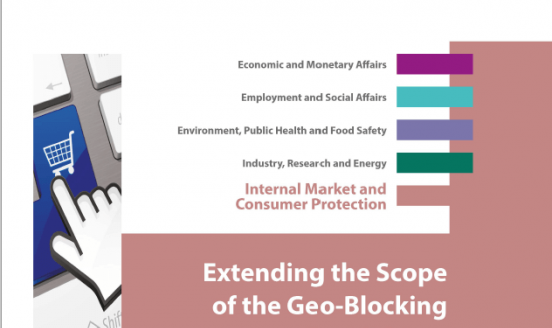
Extending the scope of the geo-blocking prohibition: an economic assessment
This paper was prepared for the European Parliament at the request of the Committee on Internal Market and Consumer Protection.
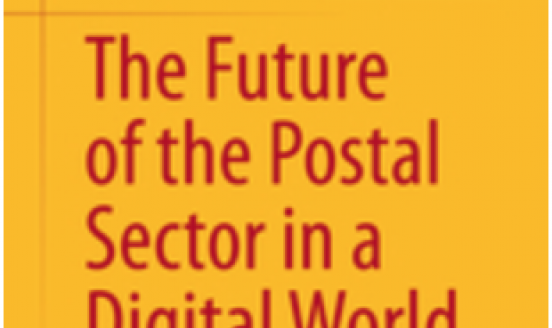
The Future of the Postal Sector in a Digital World
Addresses major current problems in postal and delivery sector worldwide

How good a shield is Privacy Shield?
Privacy Shield was put in place in 2016 to ensure that transfers of personal data from the EU to the US would be in compliance with European Union pri
Innovation and economic reform in Europe and Japan
This event is co-organised by Bruegel and the Kobe University Graduate School of Economics.
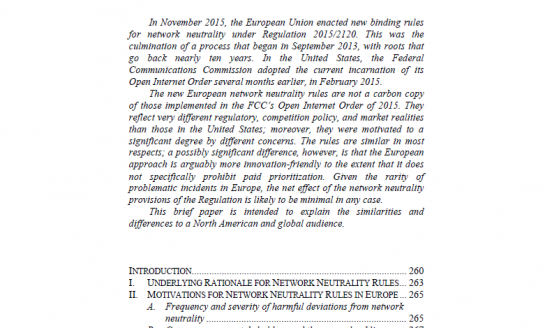
New network neutrality rules in Europe: comparisons to those in the U.S.
This paper explains the similarities and differences between European and U.S. net neutrality rules.
Brexit and its potential impact on international data transfers
If the UK exits the EU and the EEA, it will have to go to considerable lengths to enable continued data transfers from the EU. Without an agreement o
The role of market definition in a globalised economy
Have competition authorities kept up with globalisation? Geographic market definition is one of the most pressing issues.
Mobile roaming, Brexit, and unintended consequences
The intermediate and long-term consequences of the UK “Brexit” referendum of 23 June 2016 are numerous and far-reaching. There has been much discussio
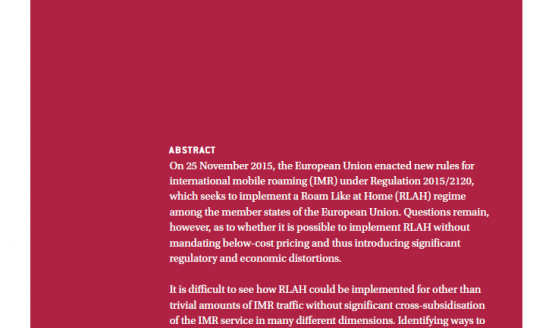
Challenging prospects for roam like at home
In 2015 the European Union adopted new rules seeking to implement a roam like at home regime for member states. This Working Paper highlights challeng
New EU net neutrality guidelines are a pragmatic next step
The new guidelines issued on the implementation of European net neutrality rules by national regulators are sensible and pragmatic.
Internet taxation: challenges and policy recommendations
As the economy moves online, it becomes more difficult for national tax authorities to collect revenue. How great is the impact, and what should corpo
European e-commerce needs better visibility into cross-border delivery prices
Consumers, retail shippers, and European and national regulatory authorities could benefit from enhanced visibility into the price of shipping goods a

E-commerce in Europe: parcel delivery prices in a digital single market
The expansion of e-commerce, a substantial growth opportunity for Europe, is hampered by high cross-border parcel delivery prices. This paper analyse

E-commerce in Europe: Lessons for parcel delivery from electronic communications
Bruegel was pleased to welcome Andrus Ansip, Vice-President of the European Commission and European Commissioner for the Digital Single Market. He dis
Data transfers under the threat of terrorist attacks
The recent terrorist attacks in Paris and elsewhere have created an atmosphere of insecurity and fear among the citizens of the main European capitals
Disruptive technologies and the impact on the economy
How should industry and policy makers think about the notion of the market in the digital economy? How is industry transforming into the new digital a

Productivity, innovation and digitalisation: which global policy challenges?
How can new technologies help the global economy recover from the shocks of recent years? Can ICT and digital innovation improve productivity and crea